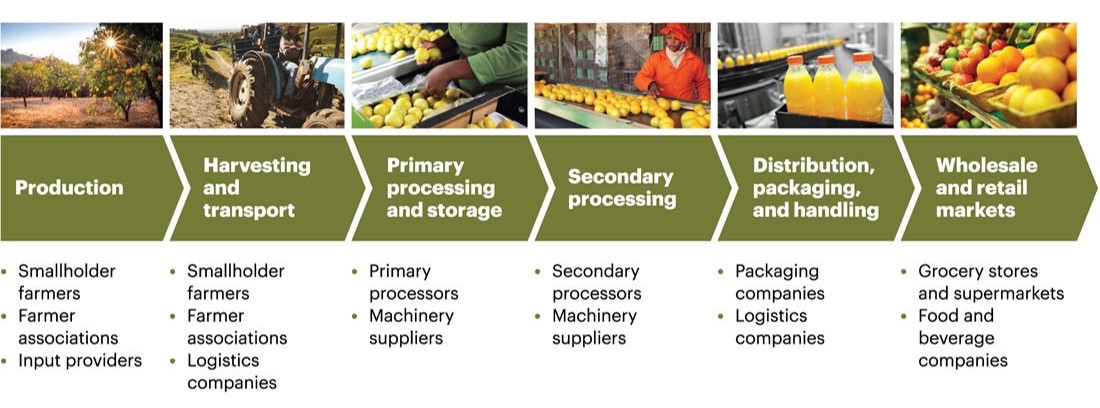
Role of the Producer in the Value Chain
As a producer, the farmer plays a pivotal part in the value chain. The farmer converts inputs into outputs (e.g., fruit, wheat, milk, etc.) thereby adding value to the final product. The decisions they make regarding how to use resources (land, seed, cattle, labour, technology, soil, fertiliser, chemicals, equipment etc) and farming techniques, skills and processes will determine the value that is added at this stage in the value chain. Therefore, they should always seek to farm efficiently and effectively so as to maximise value.
Apart from focusing on the final product, value can be added by using and selling by-products from the production process. For example, peach pips can be sold to landscapers to use in gardens or inferior grade fruit can be juiced or dried for resale.
Each part of the supply chain adds value in a similar manner by using their resources, skills, techniques, etc. to add maximum value to the value chain. Value can be added by producing something, such as cheese, or by offering a service that enhances the overall value of the outputs from the values chain, e.g., marketing.
Role of Producer Organisations in the Value Chain
Producer organisations (POs), for example, Milk Producers Organisation of South Africa, National Emergent Red Meat Producers Organisation, South African Sugar Association, South African Table Grape Producers’ Association, Grain SA and so on, go hand in hand with the increasing attention placed on the value chains that connect farmers with consumers. Such value chains demonstrate the interrelatedness of the production, transportation, processing, and marketing of farm products. Improving the coordination of activities of different role-players in the chain can reduce transaction costs, help guarantee product quality and safety, and enhance the design of marketing strategies. Producer organisations are considered instrumental in increasing the value generated throughout the chain, such as by ensuring that the quality of products is in line with the standard demanded. They can also mobilise support from other stakeholders and can help farmers negotiate a fair share of the total profit generated.
Major changes are taking place in the markets for agricultural products. The liberalisation of markets in many developing countries, including the dismantling of state-controlled marketing boards, has led to increased competition. The rise of international speciality value chains, such as those for organic and fair-trade products, has provided an impetus for the formation of new POs. Fairtrade arrangements result in a premium price only for farmers who are organised. The growth of supermarkets as major outlets for food products has led to the restructuring of supply chains because supermarkets tend to work with preferred suppliers that can offer them products of high volume and consistent quality. As individual producers are hardly ever large enough to supply all the stores in a supermarket chain, there is a need for organisations to collect, sort, grade and perform quality control of products from different producers.
The most recent World Development Report, Agriculture for Development (WDR 2008) makes the case for producer organisations as key actors in agricultural development. The report argues that they are a major part of the institutional reconstruction, one that uses collective action to strengthen the position of smallholders in the markets for farm inputs and outputs. By reducing transaction costs, strengthening bargaining power and giving smallholders a voice in the policy process, POs are a fundamental building block of the agriculture for development agenda.
Enhanced product quality is key for getting market access in modern chains. POs can help their members achieve this in various ways. They can provide information to farmers about customers’ quality requirements. Particularly with international chains, this includes assessing the many options for international certification schemes. POs can implement quality control systems. They can organise and facilitate innovation processes targeted at reaching higher product quality by, for instance, providing technical assistance to improve on-farm production methods. Finally, POs can go beyond facilitating the production and marketing process and take on the processing and marketing functions themselves.
Producer organisations can take many forms, ranging from formal institutions, such as cooperatives, to informal producer groups and village associations. A number of typologies have been developed that distinguish POs on the basis of their legal status, function, geographical scope and size.
Organisations that provide economic services include cooperatives that process and/or market the products of their member farmers. A typical example is the dairy cooperative, which processes the raw milk supplied by farmers into less perishable dairy products. Multipurpose PO's, particularly those at the community level, often combine economic, political and social functions. They provide farm inputs and credit to their members, process and/or market their products, offer community services and carry out advocacy activities.
POs exist at the village, regional, national, and even international levels. Both commodity-specific organisations and advocacy organisations often have both local and regional/national branches. Multilayer POs are structured as federations, with the lower-level organisations being members of the higher-level organisation.